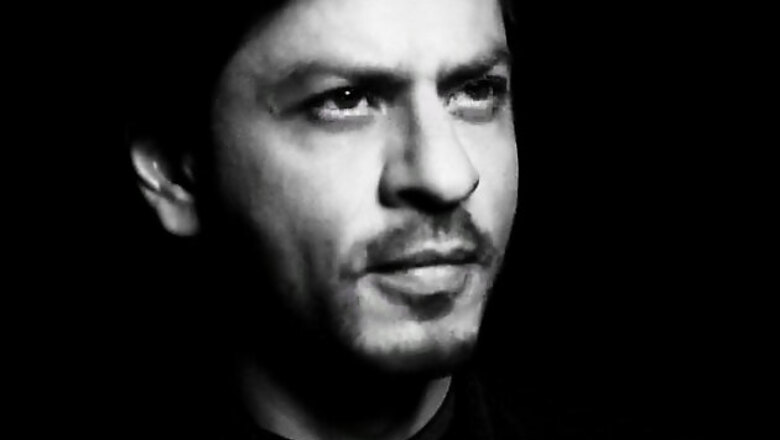
views
He ambled in trailing charm and cigarette smoke. An assistant placed a glass of whiskey in his hand. And we began to talk. Or rather, he did.
"I can do a line in a minute. I can memorise 20 pages and deliver it. I go for these rehearsals because in the space of work I am in, my performance, somewhere, besides the lines and production, I should be able to do something to improve the experience of someone watching it. That is the essential aspect of business I am in, or why I am in it, mashallah the business has prospered, I have the best of people and I have fantastic people, but we never discuss monies in this office."
Huh?
We had been warned: By people who have seen him from close quarters - "He's a master of the rehearsed ad-lib"; "He can speak and speak and say nothing, and you'll only realise that two days later"; "He will duck all questions on Red Chillies Entertainment" - by those who said we were wasting time talking business with him-"The man has no clue what he's doing" (a big-name producer); "He's lost it in his head" (a distributor) - and of course, we knew he'd be late-"With him, I just kill my ego and wait" (a director known for his punctuality, and whom most actors would kill to work for)-and so we spent a day waiting for the call from his office-"He's busy, you'll have to get here on a two-hour notice"-which didn't come, and then another day, and then we'd got the call, and scrambled to his home, where we had waited...Five...Mind...Numbing...Hours.
And then his publicist, Mandvi Sharma, told us he was coming. But: "Be gentle with him please. He's sick and running 101 degrees."
And then, yes, he ambled in, and smiled, and we suspended disbelief and forgot our irritation and were enthralled listeners. At some point, though, self-preservation kicked in. Perhaps it was the realisation that we were hearing things we'd heard before. Some we recognised, word for word, from quotes we'd read in a story on him in Outlook 13 years ago.
He was feeding us pre-digested faff. Charmingly, convincingly, with all the smooth delivery and sincerity of a used-car salesman on crack cocaine. But faff.
We gently reminded him we'd heard all this before. As gently as possible, we told him many people think he's all gas.
He didn't blink. "They're completely right. I don't take offense to that."
Did we hear a switch click? The tone was the same, but he seemed to be going off-script. "I don't need to do all this. I have enough money to last a lifetime. But you've got to have passion. You've got to be like Walt Disney. Azim Premji is like that. Ratan Tata is like that. Mukeshbhai [as he refers to Mukesh Ambani] is like that. Like them, I'm focussed, and I know why I'm doing what I am doing."
For the rest of the evening, platitudes were in short supply. We got logic, even if coated in self-deprecation, plans rather than sound-bites. About building a sustainable business, using lessons learned from the superstars of the corporate world.
He claims he doesn't understand business. But 72 hours after leaving his gravity field, the effects of his charm have worn off and it is possible to look dispassionately at what is obvious: SRK knows exactly what he is doing.
Stick to what you know: Red Chillies Entertainment, (RCE, the banner he runs his various companies under), he believes, has the potential to generate a few hundred million dollars a year, much like a Hollywood major. And it will outlast him. "Else I would have called it Shah Rukh Khan Productions. Everybody in the business names their companies after themselves. Not me. I wouldn't put my face on my company. I'd say this guy fights too much, smokes in public and does all the wrong things."
From his idols he has learned this: Focus ruthlessly on what you know, to the exclusion of everything else. And entertainment is what he does know, understand and get excited about.
If he has got into businesses that don't play to that strength, he gets out. Like when he started an equipment-leasing division. "It wasn't entertainment." He sold it to an assistant who had interned on his sets. And "I don't understand or watch these saas-bahu kind of soaps. It's worked well for Ekta Kapoor. She is a close friend and has done a great job. I can't." So Red Chillies Idiot Box, a firm he started to create television software, is now defunct.
Sport, however, is entertainment. "Sport brings kids in. It makes business sense to keep the young happy."
He had long nurtured the idea of starting something like the English Premier League (EPL). He bounced the idea off Lalit Modi, who was his senior in school. "He asked me, 'Yaar, why are you getting into football? For seven years I've been working on trying to get a cricket league going because it is commercially viable. You're an actor; continue acting.'
"When I was shooting for Om Shanti Om, he called and asked me to put $40 million for a team in the Indian Premier League (IPL). I told him, that's big money. 'He said don't bother, I'll organise the money, you just come on board.' Lalit's a smart guy. He knew with me, hype, stars and sponsors will come. Not just that. Being part of the IPL, it is like being part of the most exclusive club in the country, where nobody else can gain entry. You have Ambani, Mallya, GVK, GMR, all top-notch people. And those left outside will also want to enter.
"So I got John Buchanan, and the best sports coaches. Mukeshbhai did the same. Vijay [Mallya] did it too. Sport is a leveller. It is not like a board meeting where you talk numbers and get out."
Then there is his VFX (visual effects) business. When James Cameron thought up Avatar, he told Fox it would cost $500 million. "They told him, you're f****** crazy! Your last film grossed $600-odd million. What makes you think you'll do better?" But Cameron stood his ground, took the monies, and created a film that eventually grossed $1.2 billion.
"Think about it. He could have destroyed himself. That's the kind of guts you need. Cameron is Cameron because every film is bigger and better. His releases are now events."
"I am like George Lucas, who wanted to make Star Wars. He didn't know how to make the movie. So he said, let's get ten people who think they know how to make Star Wars. But for that they have to make software. But to make software, you need an office. But to build an office you need to buy computers. And so let's put it all together, start a company like Lucas' Industrial Light & Magic and make a film like Star Wars."
"What eventually emerged was a VFX studio. He sold it and made a lot of money. So when I think of it, I wonder why something like that won't work here.
"I like to think big. I don't think short-term. The short term doesn't scare me. I have the guts because of repeated failures in the past. If Ra.One hadn't succeeded, I would have gone on and made Ra.One II until I made it a calling card for VFX in this country.
"The bottom line is that all of these are entertainment. I've been entertainer of the year for 20 years. VFX is entertainment. Film production is entertainment. And cricket is entertainment. I am not as diversified as people think I am."
Slick is good: Ten years down the line, SRK believes, Indian film-makers will be toast. Hollywood will take over, like they did in Japan, Korea, Europe and other parts of the world. By way of examples, he talks of Christopher Nolan's Inception and James Cameron's Titanic.
Back in 1997, when Titanic was released in India, it grossed Rs 6 crore. But when Inception was released two years ago, it grossed Rs 12 crore from South India alone. In Hollywood, that's peanuts. But they're playing to a plan and every big studio, whether it's Fox, Sony, Columbia, or a you-name-them, wants a piece of India.
To drive the point home, he talks of how Fox Studios first tied up to release My Name is Khan across India. The idea wasn't to make money, but to break the gates down. "Because I am Shah Rukh Khan, every Indian outlet opened their doors to Fox. I called up the ten- twelve people who represent all theatre owners in India, and they agreed."
That was the opening they needed. Fox is now the largest distributor in India and use the channels they built with My Name is Khan to push Hollywood content into India.
Hollywood understands the math, says SRK, and they ran into trouble in the US on a simple count. On average, for a movie to fare well, it needs one screen for 100,000 people. But a glut of screens in the US meant Hollywood had to deal with an average of a screen per 10,000 people. They had to look at markets outside. India is seductive: We have one screen per million people. SRK is betting these numbers will change dramatically with infrastructure being built.
But, as more people flock to cinemas, Hollywood's finesse will eventually win them over. India may make the most movies in the world, but "With all due respect, the production values are s***. Why will my kids watch that kind of crap when Hollywood offers something slicker?"
His calculations indicate an Indian family spends roughly Rs 2,000 for each outing at a multiplex. "That's one helluva lot of money for a family to spend." And what's more, "They spend more on pop corn, samosas and fizzy drinks than on the tickets. If Indian films can't offer them a great experience for the money, it is inevitable they move to Hollywood, because they know Cameron or Nolan won't cheat them out of the experience they're looking for. I want them to come to me, not go to Hollywood."
If need be, plead: The cover story in Outlook magazine we alluded to earlier was called 'Raju Ban Gaya Businessman'. "It killed me." That was around the time Dreamz Unlimited, a company he had founded with co-star Juhi Chawla and her husband Jai Mehta, was on the verge of releasing a film called Phir Bhi Dil Hai Hindustani. The film tanked.
"India Today magazine ripped into me as well and said I don't know how to do business. But I never claimed I want to be a businessman." He is, instead, the best public relations ambassador RCE could have. "I was the first to go on the road, do television shows, go to malls and market films in those big, stupid, silly, over-the-top ways that people do today."
Usually, he says, "I never go out and ask for business." But for the VFX part, he does. "I have to convince people to trust RCE. I get access because I am Shah Rukh Khan. I went out, met Rakesh Roshan and told him 'Sir, let me work on Krrish.' He likes me and knows I will do the best job possible because I have this technical keeda [itch]."
There's more. "Hollywood collaborations are happening as well. What we refuse to do is low-end work. We want to work on the core effects. In Ra.One, that special sound effect you hear requires intricate software. These are things we build. Once you have it, you can rent it out."
"Like for Life of Pi, the guy who did the tiger did not have the software to make the tiger. He had to rent it. We don't rent technology. We make it. If I go out, it will cost me $12 million.
"We live in fortunate times. The American economy is in a bad shape. It allows us to get the top VFX guys from America and we employ them on short-term bonds. For Krrish, the top people have come down. We employ them for short periods, give them the best possible lifestyles, and ask them to teach our kids how to do it."
"The unfortunate part is these Indian boys have not had the chance to make Harry Potter fly. All they did was remove wires, because they weren't given a chance. So when I talk to them, I ask them, all your f****** life are you going to make wires? The world doesn't know what you did. But you know what you did. You just went and removed a wire. The world may not appreciate Ra.One. But you will, because you made a car fly. This is what you were meant to grow into, and I am giving you this opportunity to do it.
"I am not an IT services company. I am a software product company. And that's how I will deal with competition. When a Hollywood guy comes and chats with me, I say, I have only one request, please don't give me the wire work. I give you my word: I will deliver passion and quality. Else, take your money back."
Use yourself: He is intensely aware of how powerful he is as a brand, and isn't bashful about using his weight. And he doesn't think quarter-on-quarter.
"I don't think of cutting costs. I always tell my people, think of how to earn more money. This cost-cutting attitude comes from people who have a sab chalta hai attitude and know only how to cling to old ways of doing business. When others make a movie for Rs 40 crore, I do it for Rs 140 crore. I want it to be bigger and better; that's the only way I want this business to feed me in the future. My partnerships are not to make an extra $2-5 million.
"So when we were doing Ra.One, I was told we have superb sound, but theatres can't reproduce it and owners won't cough up the money to invest in the systems. So I personally went to Dolby and asked them if they can put 7.1 Dolby surround sound in theatres. They said they would if I added my branding to it. I called up theatre owners and told them, "Listen guys, I'm Shah Rukh Khan and I'm getting you this hardware from Dolby. Just put it up for me.' They agreed right away. It added to the viewers' experience without them even realising it.
"The graphics cards that were used to make Ra.One, each one is horribly expensive. Nvidia, the company that manufactures those cards, gave me 300 of them in return for my brand name. It's a win-win proposition for everybody.
"Tomorrow, if I'm doing a film and you come to me as a magazine and tell me you're doing a special on films and will give me Rs 20 lakh worth of publicity-it's not big money-I'll do it because it's a win-win. That way, I get better, my margins will be higher, and everybody benefits."
To get to all of this, though, he knows he has to restructure the way he operates. He's watching how the big boys do it. "Just look at Mukeshbhai. I visit Jamnagar with Nita [Ambani] and wonder, how do you build a refinery with tens of thousands of people working there, with schools and gardens and hospitals, and not a drop of oil spilling out? I go visit KV Kamath; how did he build ICICI Bank? Rajiv Bajaj, at his factories bikes get built in 15-20 minutes."
"I want to be organised and be a businessman like that," says the man who usually claims not to understand business. The first steps are being implemented. SRK understands he needs suits in the business because the "creative types can't do it." People are being shuffled and roles re-designated. That includes moving himself out of the decision-making at RCE and passing practically all of it to his CEOs, all of whom have been with him for a few years now.
RCE is making profits now, but the Hollywood-sized scale Khan wants for it is still some time away. Can it get there? What could get in its way?
Shah Rukh Khan is RCE's biggest strength and potentially, its biggest weakness. He is promoter, ambassador, mascot, rainmaker, inspiration and fund-raiser, and to fit it all in, he drives himself at a pace that would prostrate ordinary people. Sure, that's not unusual for business barons, but they are not also called upon to simultaneously spend many hours a day on film sets leaping, dancing and projecting charisma at a billion people. He's 47 now, and the abuse he has put his body through will begin to take its toll. Will his superstar status last? That's unpredictable, given the vagaries of the industry, but at a conservative estimate, he could hold his place at the top for four or five years.
Is that enough time to take Red Chillies Entertainment to the top of the food chain? Yes, business empires have scaled up in less. But there's this: Many actors, around the world, have started businesses, with ambitious, visionary plans. Not one has ever truly made a genuine success of it. King Khan won't be just fighting himself; he'll have to beat history.
And we have the best seats in the house.



















Comments
0 comment